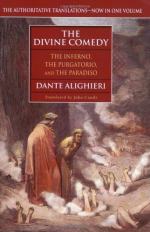|
This section contains 2,842 words (approx. 8 pages at 400 words per page) |

|
In the following essay, Terkla traces the Pilgrim's journey through Hell, Purgatory, and Paradise, focusing on one primary image in each of the poem's main sections to demonstrate that the Pilgrim attains wisdom (and that the reader may also do so).
Dante's Divine Comedy is a poetical paradox, a brilliant failure. How can one of the great works of Western literature—one of the most innovative, profound and, in many ways, unsurpassed poems of the Middle Ages—be a failure? Put simply, neither Dante nor any poet before or after him was capable of accomplishing this impossible task to use the imperfect medium of language to represent convincingly and accurately his journey to Paradise and, even more problematic, to write God, to represent the unrepresentable. Dante himself was aware of the impossibility of his undertaking, of course, and this drove him even harder, pushed him...
|
This section contains 2,842 words (approx. 8 pages at 400 words per page) |

|




